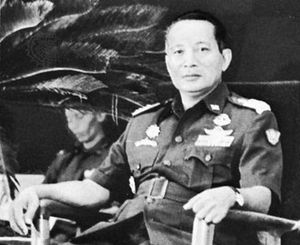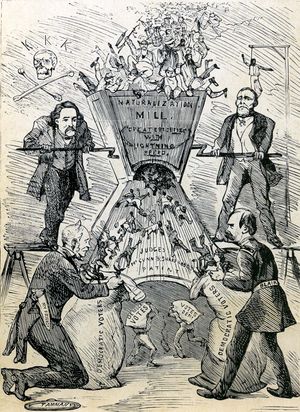nepotism
- Related Topics:
- kinship
- meritocracy
- social differentiation
- On the Web:
- International Journal of Novel Research and Development - Nepotism at Workplace (Dec. 11, 2024)
nepotism, the unfair practice of granting jobs and other favours to relatives, whether by blood or marriage. Nepotism occurs in all kinds of workplaces and fields, but it is often associated with favouritism in business and politics.
Examples of nepotism
In education, nepotism occurs when the children or relatives of wealthy or influential people are admitted to elite schools (known as “legacy admissions”). It can also occur when they receive better grades and more opportunities primarily on the basis of their family connections.
In the workplace, nepotism’s negative effects include unfair treatment, bias in decision making, exclusionary practices, and resentment. In smaller, family-run businesses, nepotism can be an advantage for building a legacy or reducing employee turnover, since family members may be expected to show more loyalty to the company. However, by excluding applicants who introduce new ideas or bring broader experience or a more diverse set of skills, nepotism hinders competitiveness and innovation and can result in company losses.
In the United States, anti-nepotism laws restrict its practice among public officials. Presidents and members of Congress are prohibited by federal law from appointing, promoting, or recommending for appointment or promotion any relative to any agency or department over which they exercise authority or control. States and cities may also have anti-nepotism laws in their ethics policies and municipal codes.
Many other workplaces have policies against nepotism, although this does not necessarily make nepotism illegal. When instances of nepotism are pursued legally, it is usually through complaints of unlawful discrimination or through allegations of impropriety. In 2011 nepotism was directly named in a lawsuit by American investors against Australian media mogul Rupert Murdoch’s News Corporation. Murdoch was accused of overpaying for the acquisition of his daughter’s television company, Shine. The suit was settled in 2013 for a sum to be paid back to investors, and News Corporation agreed to establish a compliance steering committee that would submit quarterly audits to its board of directors.
Two similar forms of favouritism are cronyism and patronage. Whereas nepotism is favouritism toward relatives, cronyism is favouritism toward friends. Patronage is the practice by a governing political party of rewarding allies and supporters with important positions in exchange for their partisan loyalty. The opposite of nepotism, and of favouritism in general, is meritocracy, in which positions and rewards are granted to people based on their abilities.
History of nepotism
In the animal kingdom, nepotism has been a biological necessity among social species. Such species included early humans. Kin selection, in which an animal engages in self-sacrificial behaviour that benefits the genetic fitness of its relatives, increases the related group’s odds for genetic survival. In the case of humans, kinship alliances also promoted intergenerational cooperation and bonding. As communities and populations grew with the development of agriculture, lineage systems of descent helped organize and control the transmission of property.
Ancestor worship and reverence for family are important in religions and philosophies such as Confucianism, in which filial piety is held as a virtue. In many medieval societies, government took the form of hereditary aristocracy, and it was customary for fathers to pass on trades as well as property to their sons. Apprenticeships could be restricted to the sons of guild members or the sons of the wealthy.
The term nepotismo was created in the 14th or 15th century to describe the corrupt practice by popes of appointing male relatives to cardinalates and other important positions. It derives from the Latin root word nepos, meaning “nephew” or “grandson,” and the Italian word nipote, which may refer to any number of relatives. Until the 11th century, when clerical celibacy was mandated by Pope Gregory VII, priests were permitted to marry and have children. Their children usually inherited religious estates and ecclesiastical offices.
Nepotism in the Roman Catholic Church allowed for the consolidation of power among noble families, including the holding of land and personal titles. The practice led to dynasties such as the notorious Borgias, who produced two popes and numerous other political and church leaders during the 15th and 16th centuries. In 1692 Pope Innocent XII decreed that popes may not grant estates, offices, or revenues to relatives, with the exception of a single appointment to the cardinalate.
In 2020 Pope Francis issued an apostolic letter aimed at reducing corruption regarding public contracts and Vatican finances. The decree prohibits any familial relationship up to the fourth degree and any affinity up to the second degree for Vatican employees serving on the juries that evaluate contract bids.
Nepotism in the modern era
Despite the rise of democracy and concepts such as meritocracy, nepotism remains widespread. In Indonesia, President Suharto’s rule from 1967 to 1998 was increasingly marked by nepotism and corruption. By the 1990s Suharto’s six children had assumed control of dozens of state-owned businesses and amassed billions in personal fortunes through corporate monopolies and trade agreements. Indonesia’s political system under Suharto earned the acronym “KKN,” for korupsi, kolusi, nepotisme (“corruption, collusion, nepotism”), and led to the collapse of the Indonesian currency in 1997.
In China in the early 21st century, the Chinese Communist Party (CCP) leadership came to be dominated by “princelings,” descendants of high-ranking officials who amassed great economic wealth and power. After ascending to the presidency of China in 2013, Xi Jinping, the son of a deputy prime minister and comrade-in-arms of Mao Zedong, promised zero tolerance for corruption in the CCP, including nepotism.
In the United States powerful political dynasties have included the Adamses in the 18th and 19th centuries, the Roosevelts in the 20th century, and the Bushes in the late 20th and early 21st centuries. After he was elected president in 1960, John F. Kennedy appointed his younger brother Robert Kennedy attorney general, which some historians argue led to the anti-nepotism statute signed into federal law in 1967 by President Kennedy’s successor, Lyndon B. Johnson. Loopholes remain that allow politicians to appoint family members to various official posts, such as Pres. Bill Clinton’s appointment of his wife, Hillary Clinton, as chair of a task force on health care in 1993 and Pres. Donald Trump’s appointment of his daughter Ivanka Trump and son-in-law Jared Kushner as special advisers in 2017.
Nepotism, cronyism, and patronage became synonymous with the “machine politics” of urban centres such as New York City and Chicago. Tammany Hall, which controlled New York’s Democratic Party from the 18th century well into the 20th century, embraced ethnic nepotism among Irish immigrants and their descendants. Chicago’s Democratic political machine similarly grew from nepotistic alliances among its Irish, Polish, Czech, German, and Jewish communities. While these alliances allowed for immigrant communities to acquire power and improve their circumstances, they also allowed local governments to become rife with corruption, cronyism, and discrimination.
In 2022 the term nepo baby became popular on the Internet. It refers to a child or relative of celebrities in the entertainment industry who also becomes successful in that field. Much discussion ensued online about the privileges of celebrity and the difficulty of gaining access to jobs in the arts and entertainment fields without a relative in the industry. Many nepo babies contributed to the debate, including actress Jamie Lee Curtis (daughter of film stars Janet Leigh and Tony Curtis), pop singer and actress Lily Allen (daughter of actor Keith Allen and film producer Alison Owen), and actor O’Shea Jackson, Jr. (son of rapper Ice Cube).














